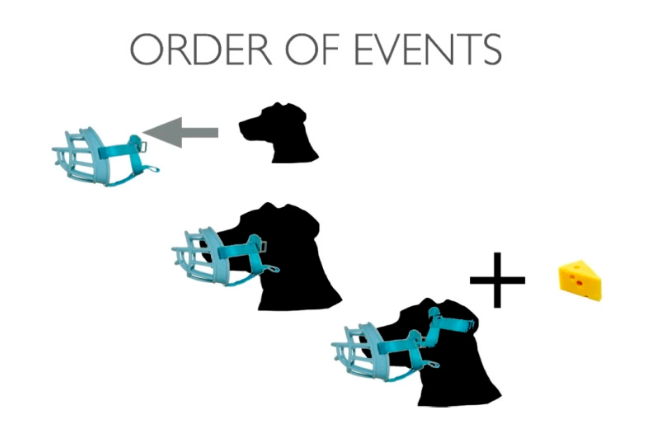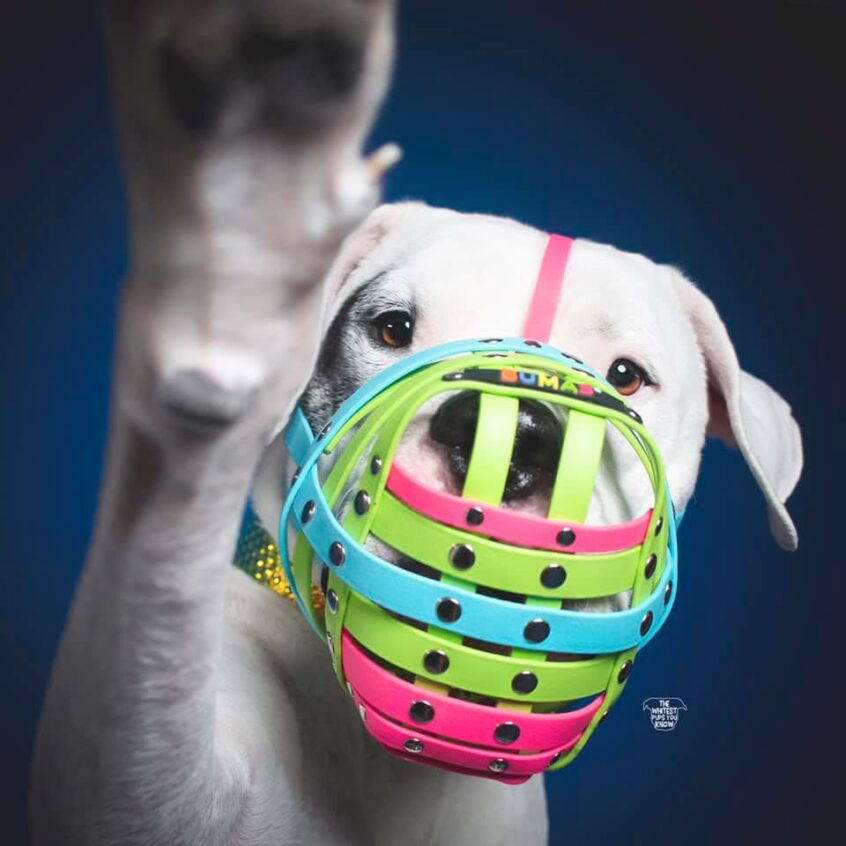In part one of this series, I talked about the importance of keeping Pavlov front and center when muzzle training. This week, I’m going to delve a little deeper into another common training mistake that can cause hiccups in the muzzle training process: Order of events. Think of Pavlov, or classical conditioning, as a way for dogs to predict what’s going … Read More
When good muzzle training goes bad
If you’ve been to one of my Muzzle Up! seminars, you’ll be familiar with the following content. If you’ve yet to attend one, get ready for some important information on how muzzle training can easily slip from competent to coercive. First, a bit about my training approach and why I train the way I do. I work a lot with … Read More
Colorful, comfortable BUMAS muzzles coming to the U.S.
Yesterday, I met up with a friend and colleague who recently got involved with the BUMAS muzzle company. For those who aren’t aware, BUMAS makes made-to-order, colorful, comfortable muzzles for all dog breeds. Many dog guardians struggle with finding a muzzle that fits their dog, not to mention one that allows for ease of movement and treat delivery. Muzzle Up’s … Read More
Muzzles are a tool, not a green light to ignore criteria
I’m currently on a flight to Albany, NY to give another Muzzle Up! seminar and, given the fact it’s a long flight, I thought I’d tackle one question I’m often asked: Will a muzzle will improve a dog’s reactivity or aggression? While The Muzzle Up! Project promotes muzzles as an excellent tool to keep dogs and humans safe in a variety of situations, … Read More
Muzzle training: Cultivating calm
When a client reaches the point in their muzzle training where they can buckle the strap on the muzzle and the dog is comfortable, we begin incorporating activities with movement: Target games, fetch, puzzle toys, and basic training cues. Focusing on movement in the training plan helps the dog learn how to move with a new object on his face, and keeps … Read More
How long does muzzle training take? Wrong question.
I’ve encountered many clients whose dogs have such a negative association with a muzzle that they either leave the room when they see it, or are too afraid to approach it for food. This happens if dogs have been forced to wear a muzzle, or only wear muzzles during unpleasant activities like the veterinarian. It also happens when a dog … Read More
Muzzle Training: A proactive approach
“Act before the animal suffers.” – RSPCA Animal Welfare Act 2006 I credit Chirag Patel with bringing my attention to these words. I remember being struck at their poignancy when I first heard them. They make sense. They provide a needed paradigm for the dog training industry. They also serve as a foundation for my work. People often ask me why I started … Read More
Muzzle training: Not just about the muzzle
Many dogs who need to wear muzzles are also fearful of hands reaching, touching and restraining them on the face, ears and snout. It’s a frustrating irony; after all, most muzzle training plans require guardians to do at least one of those things. No matter how strong a positive association a dog has to the muzzle itself, if he is uncomfortable … Read More
Elevating Muzzle Training to a Higher Standard
When I first launched The Muzzle Up! Project, I never predicted its potential impact on muzzle education, awareness, and the lives of humans and their dogs. Supporters from across the globe have amazed and inspired me, sending photos of their dogs living full and enriched lives while wearing muzzles. Most importantly, feedback from supporters shows how we as humans can use the … Read More
Guest Post: Take the Two Week Muzzle Challenge
Many thanks to Katie Grillaert, CBCC-KA, CPDT-KA, CBATI, of Fetch Dog Training and Behavior for this guest blog post. Grillaert, who specializes in training fearful and aggressive dogs, also started a community initiative called Fetch-for-Fosters, dedicated to educating people about the importance of training and to providing low-cost training services to rescue dogs. Dog-industry professionals are working hard to change the public perception for muzzles. Trainers are teaching how … Read More


